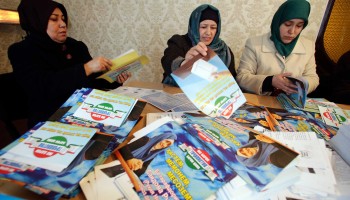Kuvatov was struck by a single bullet to the head on a street in Istanbul’s Fatih district, in the evening of March 5. He died at the scene, according to the Dogan news agency. Media reports said Kuvatov's wife and children showed signs of having been poisoned and were taken to hospital.
Turkish newspaper Hurriyet reported that Turkish police arrested three men of Tajik nationality today in connection with the shooting.
Kuvatov was a vocal critic of Tajikistan’s president Emomali Rahmon. He was leader of the Group 24 opposition movement, which publicly accused the government of corruption. After an attempt to organize mass protests last year, Tajikistan’s supreme court labeled Group 24 “extremist” and issued a ban on its activities in October.
Kuvatov was wanted by Tajik authorities for a range of alleged offences including extremism, hostage-taking and financial wrongdoing.
At the dissident’s funeral in Istanbul today, mourners held a banner accusing Rahmon of responsibility for Kuvatov’s murder, according to Radio Free Europe-Free Liberty (RFE/RL).
The killing comes just one week after Tajikistan’s national election in which Rahmon’s ruling party won 65.2 percent of the vote, securing the incumbent’s position as head of state for another five years. Rahmon has been president since 1994.
The Organization for Security and Cooperation in Europe (OSCE) expressed doubts about the legality of the election. "More than half of the vote counts observed were assessed negatively," it said in a statement, citing lack of transparency as well as ballot stuffing, multiple voting and the use of improper counting techniques.
Tajikistan remains the most under-developed of the former Soviet states. After gaining independence, the country was plunged into a five-year civil war that devastated the small Central Asian nation. According to Transparency International, today’s regime in Tajikistan is blighted by widespread cronyism and patronage.





